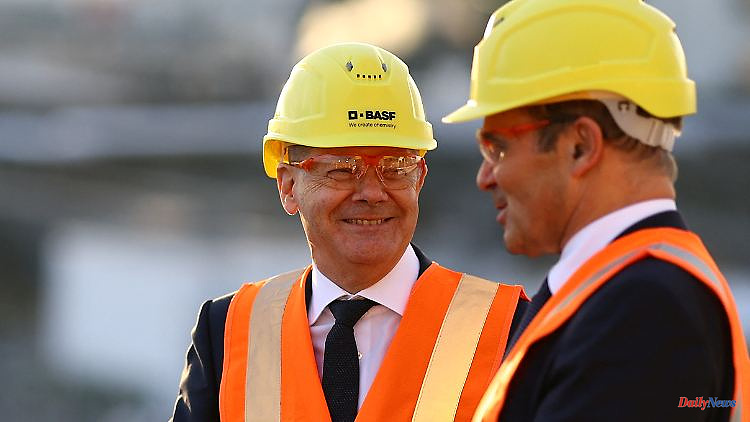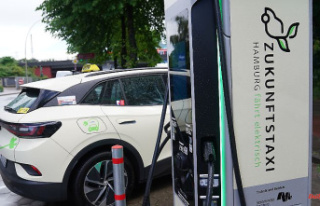In her book "Schockwellen", Claudia Kemfert takes stock of the German energy policy of the past few years. The list of mistakes is seemingly endless: the energy economist at the DIW blames today's Federal President Frank-Walter Steinmeier for a "fatal" Russia policy; Peter Altmaier that as Federal Environment Minister he blocked the expansion of renewables with "alleged shock figures"; of politics as a whole that it allows industry and the energy sector to dance on its nose. "But as you can see, the world didn't end without Russian gas," says Kemfert in ntv's "Climate Laboratory". The manslaughter argument she keeps hearing? jobs. That's why technologies from the past are being sold again today as an alleged solution for the future - and companies like BASF in China are repeating the mistakes made in Russia. Your hard conclusion? "BASF endangers the jobs of the entire economy."
ntv.de: Your book "Schockwellen" is a reckoning with the German energy policy of the past years. Why?
Claudia Kemfert: It was important to me to look back so that we don't repeat the mistakes. What got us into the energy drama with this high dependency on Russia? There are many reasons for this, but unfortunately we are again investing in fossil fuel infrastructures that we do not need to the same extent. It used to be pipelines, now LNG terminals. And they always say: It doesn't work without it. But as you can see, the world didn't end without Russian gas. And yet we keep talking about techniques from the past as alleged solutions for the future.
What were the elementary mistakes that we are repeating today?
One mistake was the fatal foreign policy of Frank-Walter Steinmeier, who had very close ties with Russia. He wanted to appease Russian aggression with gas contracts, but has achieved the opposite. We and many others have warned of this, also in Eastern Europe and the USA. But Germany did not listen.
Another example are the alleged shock figures that the former Environment Minister Peter Altmaier came up with - and the solution that he immediately provided: The energy transition will cost one trillion euros! We need an electricity price brake! However, this brake on electricity prices turned out to be a brake on the expansion of renewable energies. That is why wind energy and solar energy are stagnating. We've lost 150,000 industrial jobs that we urgently need to compete with the US and China. We gave up our leadership role with our eyes wide open and made ourselves dependent instead. This is costing us dearly today.
But isn't the prosperity of the past decades the result of these decisions? There was a legitimate interest in cheap fossil energy.
These economic interests are cited like a mantra, but the federal government also knew that the allegedly cheap energy would end up being extremely expensive. We are currently paying more than 300 billion euros for this energy disaster because the risks have been ignored and simply not taken into account. It's similar with other decisions at the moment: It doesn't work without it, otherwise jobs will be lost. But that's just not the case. These are pieces of the puzzle that lobbyists want to use to justify and legitimize investments. They only have economic advantages for a few companies - at the expense of the entire economy.
In your book you mention BASF as an example. Do individual companies really have that much influence and can steer the entire policy?
There are very strong interdependencies between politics and business. BASF is one example, Russian companies are another. Certain decisions were therefore made in favor of certain companies and sectors, knowing how dangerous this would ultimately be for the economy. When you see today how frivolously Sigmar Gabriel, as Federal Minister of Economics, made the decision to sell the Rehden gas storage facility to Gazprom... that's shocking.
How do you explain that there was no resistance?
I ask myself the same thing. Hence this book, because I have the impression that nothing has changed. Again, decisions are being waved through without anyone screaming - apart from civil society, which is now very awake, and from abroad. There have been extensive scientific studies on these subjects. At the DIW, we have been dealing with Nord Stream 2 since 2014 and showed again in 2018 that it is economically unprofitable, fatal in terms of climate policy and questionable in terms of energy policy. Nobody in Germany was interested in it, foreign media from Poland, Eastern Europe and the USA asked about it.
But even if other countries have recognized that we make mistakes in Germany and make ourselves dependent: the expansion of renewables didn't work any faster there either. Great Britain or other EU countries are far behind us.
That's right, but if we hadn't put the brakes on renewables, they could already have accounted for 80 percent of Germany's energy supply. We would have had 150,000 more valuable industrial jobs that we urgently need today. We would be much more advanced with building renovations - that was also stopped and slowed down at the time. We would be much further along in the industrial transformation. We got off to a good start, were world leaders, but ten or twelve years ago we announced that we gambled away this competitive advantage - precisely because of the links between certain companies and politics. This dependency on Russia is unique in the world, it only exists in Germany. Now we are paying gigantic amounts to free ourselves - and the companies responsible are even being helped. That makes me angry.
But there are studies for both the LNG terminals and Lützerath that say: We need these terminals. We need the coal. How does that come about?
This can be explained well by Manuela Schwesig, Prime Minister of Mecklenburg-Western Pomerania, and a study on the usefulness of Nord Stream 2. This study was created by the EWI Institute on behalf of Nord Stream 2 AG, but has since been removed from the website. This commissioned study looked at how much gas is required for the pipeline to pay off. Instead, at the DIW, we compared Germany's energy policy and climate policy goals with the business necessity of Nord Stream 2. These are different questions with different results. The state government preferred to rely on the commissioned study, which is why it was for Nord Stream 2. It's similar with Lützerath: the state government commissioned a study that mainly included figures and calculations from RWE.
Economics Minister Robert Habeck reacted very allergic to the accusation that overcapacities could be built with the LNG terminals. He prides himself on having secured the energy supply. Can you understand that?
I can understand that he's under a lot of pressure. Especially in a situation that Robert Habeck and the Greens are in no way responsible for, but have to spoon out the soup. Nevertheless, we repeat the mistakes of the past. We have to show that. Certainly he also gets massive pressure from the gas-intensive industry. We know the whisperers with good connections in politics. They give the impression that Germany will perish without the terminals. But if you look at the numbers, a gas embargo would have been possible even in Germany from the first day of the war. The prices would have gone up, of course, we would have had to save a lot, no question about it. The pressure on the government would have been much higher. But these liquid gas terminals are completely oversized. Simply because a huge demand for gas is planned, which has always been artificially extrapolated in the past. Our studies have been ridiculed for this scientific statement for over 15 years, but at the end of the day we have always been right. It will be the same with the liquid gas terminals.
But how does that fit together? They say we're building up huge overcapacity; BASF says the energy supply in Germany is not secured - and is building a new factory in China with exactly this argument.
BASF in particular has always been part of the problem. They have been presenting politicians with moon figures for gas consumption for years and have thus introduced us to this energy drama. However, BASF is not held responsible and is even compensated indirectly. I think the expansion in China was a mistake, and that's not without controversy even at the management level of the group. Because problematic developments and military conflicts are also possible there. Then BASF is again the first company to call for help and compensation. It is unacceptable for corporations to affect the entire economy with their high-risk investments. And instead of criticizing BASF, we freeze in shock. Actually, one should say: Have fun, please leave our economy alone.
Are companies like BASF cheating on the federal government?
Yes, BASF is fooling the government. This company has a direct line to the highest political offices and has contributed significantly to our dependence on Russia. This can also be seen in the handover of the gas storage facility from the BASF subsidiary Wintershall to Gazprom. At the time, this was waved through with a few pages of paper in the Federal Ministry of Economics. But for a permit for a wind turbine you need 20 files? In the end, everyone will pay for it again, just not BASF. On the contrary, there people act as if the lights are about to go out.
Jobs are at risk.
That's a manslaughter argument, I've known that for 15 years now. But BASF endangers the jobs of the entire economy.
Because the same dependencies threaten us in China as in Russia?
This is a similar scenario. It is definitely not wise to increase dependency. Nobody knows what will happen, but we should all learn from Russia. Instead, BASF and some car companies are once again making high-risk investments. If that goes wrong, it will be difficult for Germany. That is why Economics Minister Habeck rightly warns against China. At this point he has the right alarm bells on.
Clara Pfeffer and Christian Herrmann spoke to Claudia Kemfert. The conversation has been shortened and smoothed for better understanding.












